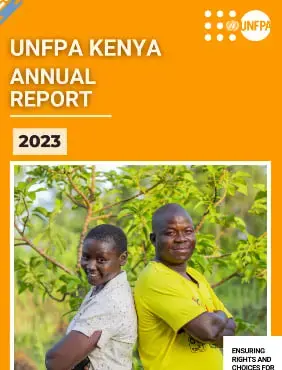2023 marks the second year of the 10th Country Programme of UNFPA support to the Government of Kenya. As reflected in this Annual Report, collective efforts by UNFPA, the Government of Kenya, partners in civil society, academia, the private sector, and our generous donors have propelled us closer to achieving the shared vision of a world where every pregnancy is wanted, every childbirth is safe, and every young person's potential is fulfilled.
UNFPA worked with partners to improve family planning access to the last mile. Our efforts extended beyond the provision of commodities and services to investments in strengthening healthcare and supply chain systems, enhancing the capacity of healthcare workers both in the private and public sectors, and supporting innovative approaches such as the Total Market Approach (TMA) to ensure sustainable access to family planning methods for all, regardless of income level.
The Country Office also intensified its focus on maternal healthcare through initiatives like the training of healthcare workers in Emergency Obstetric and Newborn Care (EmONC) and the prevention and management of unsafe abortion to reduce maternal mortality and morbidity. With support from partners including AMREF Health AFRICA, M-Pesa Foundation, Flying Doctors Society of Africa, and various county governments, UNFPA took significant strides towards ending fistula, a devastating childbirth injury by providing free reconstructive surgery to restore dignity to those living with the condition. As part of the campaign to end Fistula, UNFPA also supported livelihood skills training for women who have been marginalized due to the condition.
UNFPA’s commitment to combating gender-based violence and harmful practices remained unwavering. By engaging grassroots organizations, mobilizing communities, and integrating sexual and reproductive health interventions into county development plans, the country office intensified efforts to transform harmful social norms and protect the rights of women and girls.
As Kenya navigated humanitarian crises, including prolonged drought and devastating floods brought on by the El-Nino weather phenomenon, UNFPA scaled up efforts to deliver life-saving sexual and reproductive health and gender-based violence services in the worst affected counties. UNFPA was able to move with speed and agility in responding to the urgent needs of affected populations, including those displaced by climate-related emergencies, ensuring their access to essential services, including skilled birth attendance, family planning, and psychosocial support. This was made possible through the generous support of donors, including the UN CERF, the Government of Japan, the Government of the Philippines, and the Government of Ireland, and implemented through the Government of Kenya and humanitarian response partners.
Our focus on adolescents and youth remained central to our agenda. Through targeted interventions, innovative partnerships, and capacity-building initiatives, UNFPA empowered young people with the knowledge, skills, and opportunities they need to make informed decisions about their sexual and reproductive health and rights. Additionally, UNFPA supported the Ministry of Health in developing a digital tool for the assessment of health facilities on the attainment of 8 quality standards for the provision of adolescent and youth-friendly services. Once deployed, the tool is expected to provide real-time data on facilities providing youth-friendly services in the country.
None of these achievements would have been possible without the generous support of our donors and the dedication of our partners. To them, we extend our heartfelt gratitude for their unwavering commitment to advancing the rights and well-being of women, girls, and marginalized populations. As we look ahead, UNFPA remains resolute in our pursuit of a future where every individual can realize their full potential.


